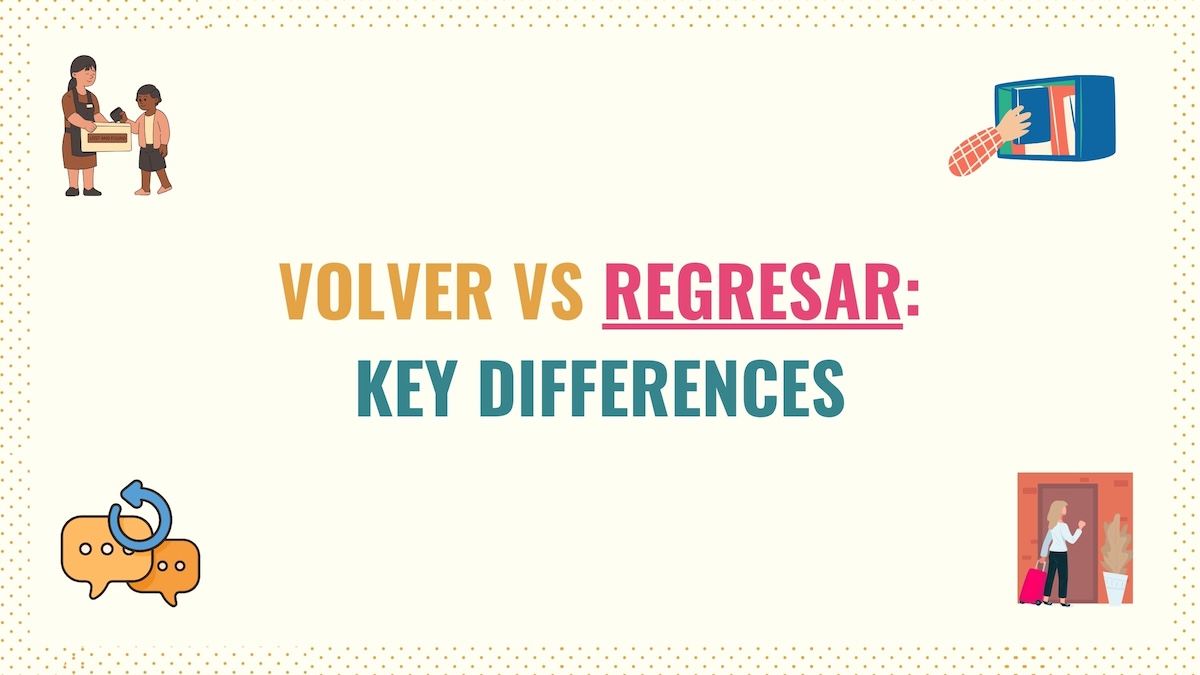Volver and regresar mean ‘to return’ or ‘come back’. However, in Spanish, volver implies that a person returns to a place or repeats an action. Regresar also expresses that someone returns somewhere, but, unlike volver, it also relates to returning something.
Cuando regresé a mi casa volví a ver la película.
When I came back to my house I saw the movie again.
Volvimos a la tienda a regresar unos zapatos.
We went back to the store to return some shoes.
Volver vs Regresar Key Points
- ‘Volver’ and ‘regresar’ are synonyms when talking about returning to a place.
- With this meaning, both verbs work with the preposition ‘a’ and nouns.
- ‘Regresar’ also refers to returning something to someone.
- Use volver + a + infinitive to express that an action is being repeated.
- This structure is translated as ‘again’.
- ‘Volver’ is not an irregular verb, but rather a stem-changing verb (O to UE).
- Although it’s a derivative of ‘volver’, ‘devolver’ mainly refers to returning an object.
Understanding volver vs regresar is key for communication since they’re two of the most common Spanish verbs you must know. Below, you’ll learn exactly how and when to use them.
When to Use Volver in Spanish
In Spanish, the verb volver communicates that a person is returning to a certain place. To specify the location someone is returning to, we must use the structure volver + a + noun.
[Volver conjugated] a + [determiner] + [noun]
Ashley vuelve mañana a la oficina.
Ashley comes back tomorrow to the office.
Nunca volvería a ese restaurante.
I’d never return to that restaurant.
¿Te vas mañana? Y, ¿cuándo vuelves?
You’re leaving tomorrow? And when will you come again?
As you can see in example #3, the preposition a is not required if the place is omitted.
Refer to repeating actions
One of the most important applications of volver is to express that someone performs an action again.
[Volver conjugated] a + [infinitive verb]
¿Cuándo vuelves a venir?
When do you come again?
Voy a volver a marcar en cinco minutos.
I’m calling again in five minutes.
No sé cuándo volveré a verla.
I don’t know when I’ll see her again.
Although they look similar, devolver and volver are not synonyms. Unlike volver, the verb devolver is used to talk about returning something to a place or another person.
Juan nunca me devolvió mi dinero.
Juan never returned my money.
Tengo hasta el viernes para devolver estos zapatos.
I have until Friday to return these shoes.
Take Note: Even though they have different uses, these verbs share similar conjugation patterns. The conjugations of volver and devolver involve an O to UE stem change in the present tense.
When to Use Regresar in Spanish?
Just like volver, regresar is also used to indicate that a person returns to a location:
[Regresar conjugated] + a + [place]
¿Cuándo regresas a México?
When are you coming back to Mexico?
Adriana regresó al banco por sus papeles.
Adriana returned to the bank for her papers.
¿No te gustaría regresar a la escuela?
You wouldn’t like to return to school?
When combined with the preposition de, ‘regresar’ communicates that a person is returning from an activity or place:
[Regresar conjugated] + de + [infinitive/noun]
¿A qué hora regresan de trabajar?
What time do you return from work?
Lucía regresa de la oficina a las cinco.
Lucia returns from the office at five.
A key differentiator between volver and regresar is that the latter is used to talk about returning something:
¡Regrésame la camisa que te presté!
Give me back the shirt that I lent you!
Mañana te regreso tu dinero.
I’ll return your money tomorrow.
Tiene veinte días para regresar su compra.
You have twenty days to return your purchase.



